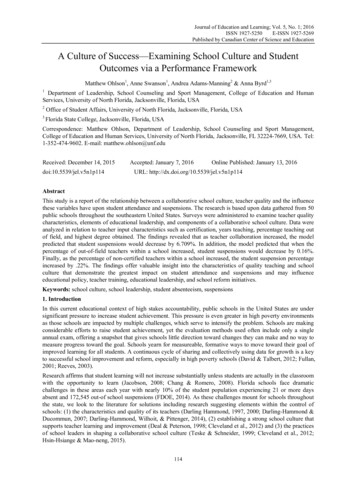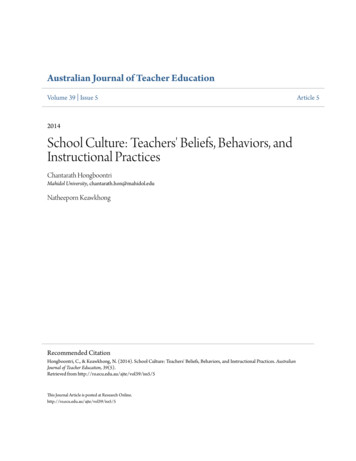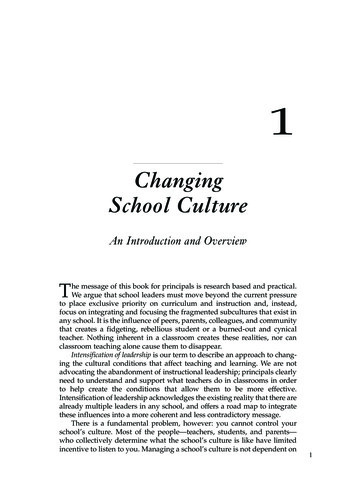
Transcription
School culture and students’achievementDr. Samia Al FarraChief Education OfficerTaaleemDubai, United Arab Emirates
Introduction What is school culture and students‘ achievement? Climate? Schools Character?activity 1 Theory and practiceMy role as a Chief Education Officer – Taaleem Management groupDifferent curricula schools in Taaleem (Dubai/Abu Dhabi)My previous experiences in Kuwait and Jordan The role of school leaders and staff in promoting students’ achievement. The case ofDBS and AAM The role of parents in students’ achievementSchool culture and hosting country. Activity 2How can we build a positive school culture that enhances learning andachievement?Conclusion
What is a School culture?“The deeper level of basic assumptions and beliefs that are sharedby members of an organization, that operate unconsciously, andthat define in a basic ‘taken-for-granted’ fashion an organization'sview of itself and its environment”. These produce group norms,sentiments, values and interactions in the work place.It gives the school its unique identity or character.W.K. Hoy, C.G. Miskel, Education Administration. Theory research and practice, 3rd edition.
Harvard educator Roland Barth’s observed: “A school’sculture has far more influence on life and learning inthe schoolhouse than the state department ofeducation, the superintendent, the school board, oreven the principal can ever have.”21 C.Elbot & D. Fulton, Building an intentional school culture. (Thousand Oaks, CA: Corwin Press, 2008).2 R. Barth, “The culture builder,” Educational Leadership, 2002, 59 (8), 6-11.
“Drawing on research on “smart and good schools”, CEP defines“character” broadly to include both moral character—treating otherswell (through kindness, honesty and respect)—and performancecharacter, doing things well (as demonstrated by perseverance, criticalthinking, and a commitment to quality). A true school of character hasa school culture that requires the best of students and teachers inboth realms—doing one’s best work and being one’s best ethicalself”.Developing and Assessing School Culture - A New Level of Accountability for SchoolsA Position Paper of the Character Education Partnership (CEP)
“Performance excellence and ethical excellence are born from aculture. As Ron Berger observes in his book An Ethic of Excellence,students’ achievement and character are shaped by the culture aroundthem. Regardless of their background, when students enter a culturethat demands and supports quality work and moral character, theytend to work to fit into that culture. Once they enter a school culturewith a powerful virtuous ethic, that ethic becomes their norm. It’swhat they know.”Developing and Assessing School Culture - A New Level of Accountability for SchoolsA Position Paper of the Character Education Partnership (CEP)
“Students themselves testify to this power of school culture to changehow they experience school and approach their work. A sixth-grade girlwas asked how her current school, in which students regularlypresented their work to classmates and other audiences, differed fromher previous school. She described the difference in terms of schoolculture: “In this school, everyone looks at my work. In my old school,only my teacher knew anything about my work. I have to try muchharder in this school because the work is more important.”Developing and Assessing School Culture - A New Level of Accountability for SchoolsA Position Paper of the Character Education Partnership (CEP)
What Educational Research Shows Of the 134 secondary schools in England that were part of the2004 Hay Group study, “the successful schools had a much moredemanding culture—hunger for improvement, promotingexcellence, holding hope for every child—while less successfulschools had less of a press on improvement.”Developing and Assessing School Culture - A New Level of Accountability for SchoolsA Position Paper of the Character Education Partnership (CEP)
What Educational Research Shows-School improvement throughchange of culture A review of research on school success finds that high staffproductivity and student achievement are both linked to “positiveschool climate.”Developing and Assessing School Culture - A New Level of Accountability for SchoolsA Position Paper of the Character Education Partnership (CEP)
A positive school culture broadly conceived includes the school’s: Social climate, including a safe and caring environment in which all students feel welcomedand valued and have a sense of ownership of their schoolIntellectual climate, in which all students in every classroom are supported andchallenged to do their very best and achieve work of quality; this includes a rich, rigorous,and engaging curriculum and a powerful pedagogy for teaching itRules and policies that hold all school members accountable to high standards of learningand behaviorTraditions and routines, built from shared values, that honor and reinforce the school’sacademic and social standardsStructures for giving staff and students a voice in, and shared responsibility for, solvingproblems and making decisions that affect the school environment and their common lifeWays of effectively partnering with parents to support students’ learning and charactergrowthNorms for relationships and behavior that create a professional culture of excellence andethics.Developing and Assessing School Culture - A New Level of Accountability for SchoolsA Position Paper of the Character Education Partnership (CEP)
My role as a Chief Education Officer at TaaleemThe following are my three main roles at the organization:1. Professional responsibility and accountability for the effectiveness, availabilityand value for money of the Taaleem schools and educational services2. Leadership both within Taaleem to secure and sustain the necessary changes toculture and practice, and beyond it so that Taaleem schools and educationalservices achieve excellent outcomes for all and are organized around childrenand young people’s needs3. Building and sustaining effective partnerships with and between those local,regional and international bodies who also provide educational services in orderto focus resources (financial, human, physical or any other resources) jointly onachieving excellent outcomes for children and young people
The role of school leaders in promoting Students’ achievementDubai British School – Good DSIB rating “Dubai School Inspection Bureau”“One of the most important actions that a school leader takes is to payattention to the culture within a school. A principals’ impact on learning ismediated through the climate and culture of the school and is not a directeffect. If the culture is not hospitable and conducive to learning, thenstudent achievement will suffer. School principals are responsible forestablishing a pervasive culture of teaching and learning in their school toensure that student attainment is always improving. Focusing on thedevelopment of the school’s culture as a learning environment is fundamentalto improved teacher morale and ultimately student achievement”.Mark FordPrincipalDubai British School
Photos of good practiceDubai British School
American Academy in Al Mizhar- Good DSIB rating “Dubai School Inspection Bureau”“The school principal plays a key role in establishing a school’s culture. The schoolprincipal ensures that all decisions made in his/her school align with the school’s missionand vision, and all stakeholders embrace this mission and vision. That is a school’s beliefsystem.However, I believe it goes beyond the mission to fundamental insights on people.Students who are comfortable in the school’s surroundings-they feel nurtured and safewant to come to school and learn. Staff respected and empowered to make decisions fortheir students-they love to come to school each day. They do not want to leave after theircontract ends. Parents who are encouraged to be part of the school community andprovide feedback to help improve the school- do not want to transfer to another school.Visitors to the school can feel the school’s pulse upon entering the lobby. There is afeeling that says students are happy and successful in this school.From the day we opened our doors at AAM, I have tried to develop a family styleenvironment/t culture. Yes, student progress and subsequently attainment is improvingeach year. I believe that the secret ingredient that makes it happen is the familyenvironment that exists in our school community”.Delice ScottoPrincipalAmerican Academy in Al Mizhar
Photos of good practiceAmerican Academy in Al Mizhar
School culture and hosting country cultureEffort vs. AbilityActivity 2-Does the hosting country culture impact on the school culture?
Conclusion: There is a positive correlation between school culture andstudents’ achievement.Let us all work towards a positive school culture which includes highexpectations for learning and achievement, a safe and caringenvironment, shared values and trust, a powerful pedagogy, a meaningfuland relevant curriculum, high student motivation and engagement, aprofessional faculty culture, and partnerships with families and thecommunity.
References W.K. Hoy, C.G. Miskel, Education Administration. Theory research and practice, 3rdedition,1987. Developing and Assessing School Culture - A New Level of Accountability forSchools. A Position Paper of the Character Education Partnership (CEP), taken fromthe internet on Sep 30, 2012 C. Elbot & D. Fulton, Building an intentional school culture. (Thousand Oaks, CA:Corwin Press, 2008). R. Barth, “The culture builder,” Educational Leadership, 2002, 59 (8), 6-11. Interviews with Mark Ford, DBS principal and Delice Scotto, AAM principal –Taaleem schools,September,2012, Dubai – UAE Introduction to Taaleem 2012 booklet.
Appendices
different schoolsAmerican Academy in Al-Mizhar (AAM), DubaiLaunch year: 2005Curriculum: American Curriculum(Based on Michigan State and US national standards)Faculty: North American and InternationalClasses: Pre-K – Grade 12Status: CIS Accredited and NEASC AccreditedJumeira Baccalaureate School, (JBS), DubaiLaunch year: 2010Curriculum: IPC, MYP, DPFaculty: InternationalClasses: KG 1 up to Grade 12Status: IB World SchoolDubai British School (DBS), DubaiLaunch year: 2005Curriculum: English National CurriculumFaculty: Mainly BritishClasses: Foundation – Year 13Status: CIS AccreditedRaha International School (RIS), Abu DhabiLaunch year: 2006Curriculum: PYP, MYP, DPFaculty: InternationalClasses: KG1 to Grade 12Status: IB World School, Regular Member of ECISGreenfield Community School (GCS), DubaiLaunch year: 2007Curriculum: PYP and MYPFaculty: InternationalClasses: KG1 – Grade 12Uptown Primary School (UPS), DubaiLaunch year: 2005Curriculum: PYP IB World SchoolFaculty: InternationalClasses: KG1 – Grade 6Status: IB World School, Regular Member of ECIS
different schoolsUptown School (UTS), DubaiLaunch year: September 2012Curriculum: International Baccalaureate, intending to offer the following three IB programmes: PYP, MYP & DPFaculty: InternationalClasses: Pre-K to KG 2 in September 2012, Grade 1 to 8 in September 2013, Grade 9 to 12 in September 2014Student body: Co-educationalThe Children’s Garden (TCG) 3 campuses, DubaiLaunch year: 2005, new campus in 2012Curriculum: International Curriculum for Languages and Creative Arts (ICLCA)Faculty: InternationalClasses: Pre-nursery– KG2
Developing and Assessing School Culture - A New Level of Accountability for Schools A Position Paper of the Character Education Partnership (CEP) My role as a Chief Education Officer at Taaleem The following are my three main roles at the organization: 1. Professional responsibili











